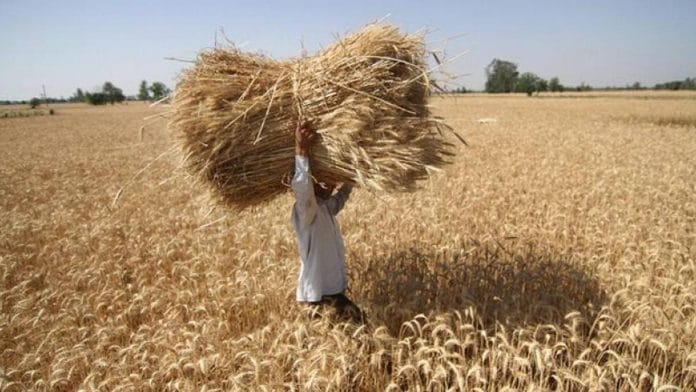New Delhi: A month after farmers across Pakistan led widespread protests against the government for slashing wheat procurement, there seems to be no relief for them. Despite exporters coming forward to sell the excess grain in the global market, the government hasn’t been able to make up its mind and a committee was still assessing wheat stock in the country.
An X post by a climate activist has highlighted how the ongoing wheat crisis is still hurting farmers— the grain isn’t even being sold at break-even price and farmers are staring at debts, higher interest rates, fewer crops and greater losses.
The activist, Maryam J, even suggested solutions before Pakistanis that could help the farmers. And it came from rice. “Donate and support farmers in buying their seed for the rice crop so that they do not have to bear another financial crisis just to feed their families. In ag dominated economies, every season matters, and for landless farmers even more,” she said.
The exporters, meanwhile, have sought permission from the government to export 3.9 million tonnes of the grain. But Pakistan hasn’t exported wheat since FY20.
“Vested business interests of the ruling elite and the military establishment are a direct cause of the exploitation and mismanagement of Pakistan’s natural resources. Please continue talking about the wheat crisis because the farmers are suffering and they need the public’s help”, one X user wrote.
A continuing crisis
The Pakistan wheat import scandal of 2024 involved the caretaker government importing a substantial quantity of wheat despite existing surplus stocks. It resulted in an alleged loss exceeding 300 billion Pakistani rupees to the national exchequer.
Speaking to ThePrint, former finance minister of Pakistan, Miftah Ismail, said that the country’s government should now “get out of the business of setting up wheat prices”.
“The government, at present, needs to ensure that farmers have enough money for the next harvest, help them with small term loans, tractor subsidies, provide them inputs but let the markets decide the rate so that the farmers are not left high and dry.”
The Pakistani government purchases wheat directly from farmers, monitors supply levels and ensures market stability by releasing wheat to flour mills directly and to consumers through public utility stores. However, this year has been different.
Pakistan’s wheat story– crisis, surplus, dilemma
Post the 2020 floods, the government allowed private sector import of wheat due to lesser produce. This led to a problem— between September 2023 to March 2024, Pakistan imported over 3.5 million tonnes of wheat from international markets at lower prices.
About 778,000 metric tonnes of wheat were imported in the first two months of the Shehbaz Sharif government. The farmers were not informed of this.
This influx of wheat flooded the market, driving prices down and causing distress among farmers who struggled to sell their produce at the minimum support price (MSP) of Rs 3,900 per 40 kg.
Consequently, widespread farmer protests erupted across Pakistani cities.
The farmers are stuck in a toxic cycle of dependence on the government— only if the government buys the wheat at a particular rate will they be able to make some profit and also buy more seeds for harvesting.
Agriculture makes up nearly 23 per cent of the GDP of Pakistan and wheat makes up 2 per cent of the whole. Amid criticism, Maryam Nawaz had earlier denied any corruption and wheat crisis in May while Shehbaz Sharif had assured of a high-level committee to look into the issue.
Ironically, the government of Pakistan has now refused to buy wheat from farmers to ensure no corruption occurs. One X user called her “Lumber one CM who will ultimately cause food scarcity’. Another just had one thing to say: ‘Back to the era of Zia’.






